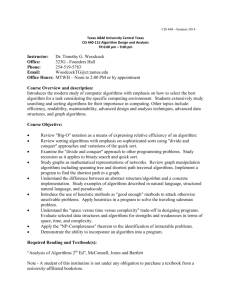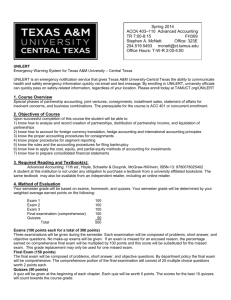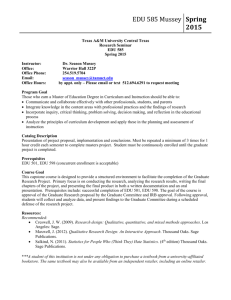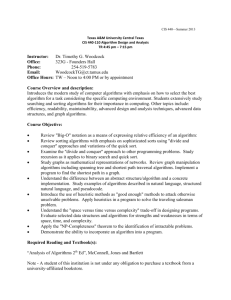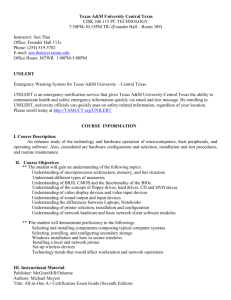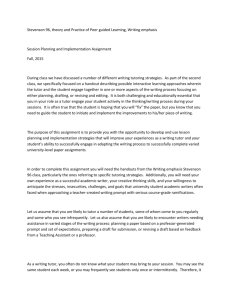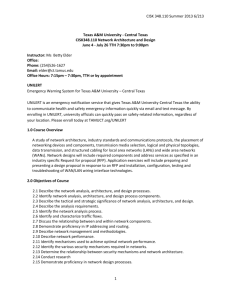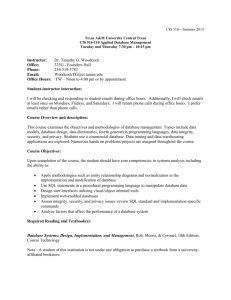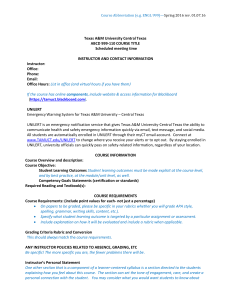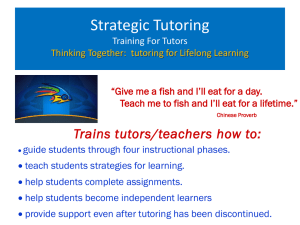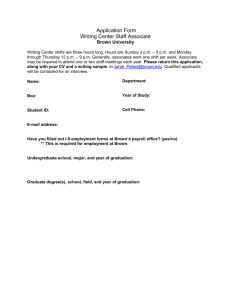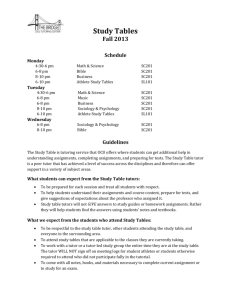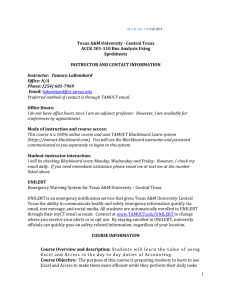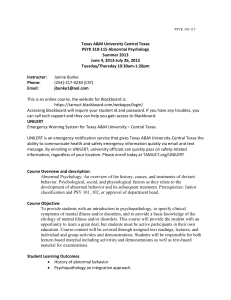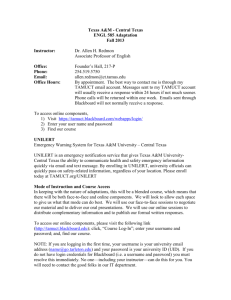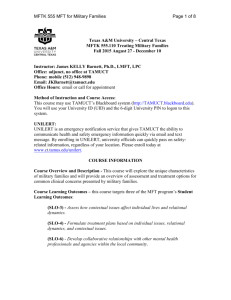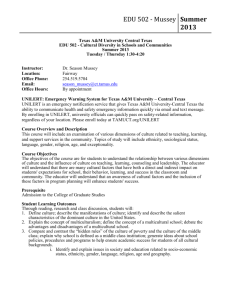Artificial Intelligence - Texas A&M University
advertisement
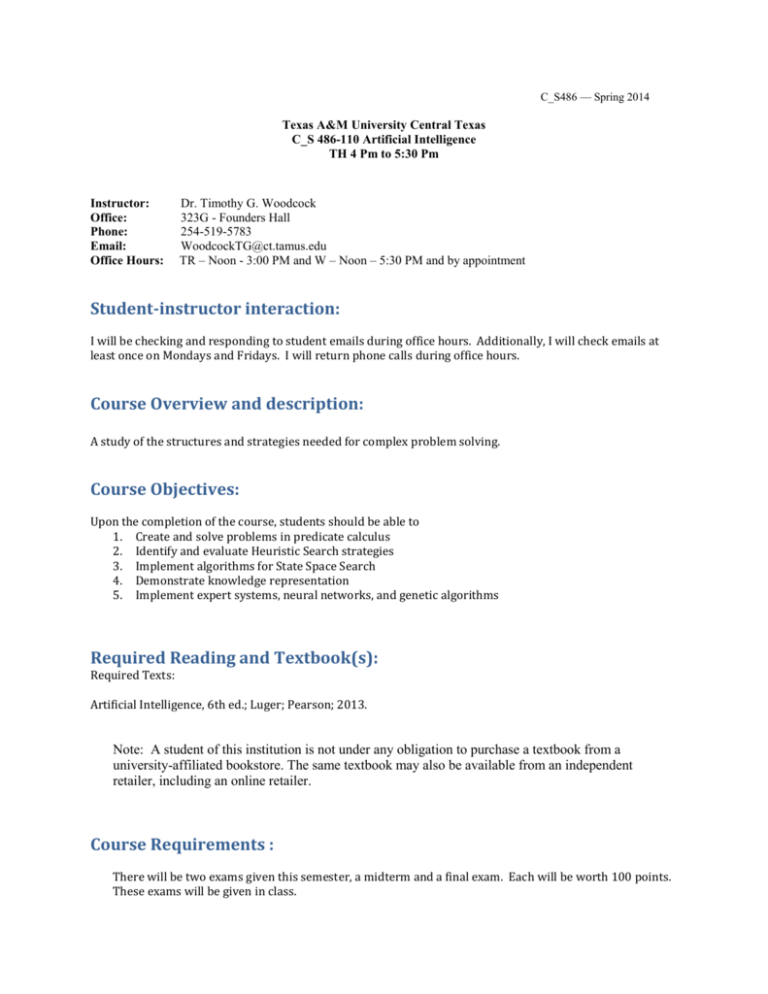
C_S486 — Spring 2014 Texas A&M University Central Texas C_S 486-110 Artificial Intelligence TH 4 Pm to 5:30 Pm Instructor: Office: Phone: Email: Office Hours: Dr. Timothy G. Woodcock 323G - Founders Hall 254-519-5783 WoodcockTG@ct.tamus.edu TR – Noon - 3:00 PM and W – Noon – 5:30 PM and by appointment Student-instructor interaction: I will be checking and responding to student emails during office hours. Additionally, I will check emails at least once on Mondays and Fridays. I will return phone calls during office hours. Course Overview and description: A study of the structures and strategies needed for complex problem solving. Course Objectives: Upon the completion of the course, students should be able to 1. Create and solve problems in predicate calculus 2. Identify and evaluate Heuristic Search strategies 3. Implement algorithms for State Space Search 4. Demonstrate knowledge representation 5. Implement expert systems, neural networks, and genetic algorithms Required Reading and Textbook(s): Required Texts: Artificial Intelligence, 6th ed.; Luger; Pearson; 2013. Note: A student of this institution is not under any obligation to purchase a textbook from a university-affiliated bookstore. The same textbook may also be available from an independent retailer, including an online retailer. Course Requirements : There will be two exams given this semester, a midterm and a final exam. Each will be worth 100 points. These exams will be given in class. C_S486 — Spring 2014 Programming Assignments There will be four programming assignments each worth 100 points. These will be assigned in Blackboard as the semester progresses. Homework Assignments There will be four homework assignments each worth 50 points. These will be assigned in Blackboard as the semester progresses. Term Papers There will be a Research Paper worth 200 points each. Each student is required to write a major paper on a topic from the course that is of interest to you. The topic for paper one must be approved by the professor by the end of the first live class. You will be expected to research the topic, show the current state of the art, make a hypothesis, and draw a conclusion in your paper. This paper must be 10 to 15 pages in length (type written and double-spaced, 12-point font with 1 inch margins) excluding bibliography, table of contents, graphics, tabular or illustrative material. References should include current sources and must conform to IEEE style. (For IEEE style manual see: http://www.ieee.org/documents/stylemanual.pdf.) The paper is expected to meet graduate-level standards and be suitable for publication in a professional journal. References must be from peer reviewed journals only. Use of Wikipedia or the class text as a reference will cause a serious loss of points. References must include the published journal name and information, NOT just a URL where you found the paper. Papers without citations will receive zero points. Term Paper Grading Rubric Paper topic approved before second class meeting. 15 points Suitable for publication in an IEEE journal Partially met the criteria Late 7 points Did not meet criteria In IEEE style 50 points Incomplete or incorrect 10 to 40 points Not in IEEE style 0 points Only website references 10 to 35 points No references or use of Wikipedia or class text. Only URL’s in reference. 0 points Spelling and grammar 25 points Some references from peer reviewed journals or conferences 45 points No issues 25 points Writing style and page length. 65 points Clear and well organized. 65 points Using passive voice or minor grammar issues 20 to 5 points Ideas not well expressed or paper poorly organized. 50 to 10 points More than 10 grammar or spelling issues. 0 points Very unclear. 0 points. In IEEE style 50 points Sufficient references 45 points Met the criteria On time. 15 points Not approved/submitted 0 points C_S486 — Spring 2014 Unless prior arrangements have been made, all late assignments will lose 30% of the available points before being graded. Grading Computation Item Midterm Exam Final Exam Team project Research Paper Online Activities Percentage 100 100 400 200 200 Complete Course Calendar Date Content 1/14/2014 Chapter 1 & 2 1/21/2014 Chapter 2 1/28/2014 Chapter 3 2/4/2014 Chapter 4 2/8/2014 Chapter 5 2/11/2014 Chapter 6 2/18/2014 Chapter 7 2/25/2014 Chapter 8 3/4/2014 Midterm Exam 3/11/2014 Spring Break 3/18/2014 Chapter 9 3/25/2014 Chapter 10 4/1/2014 Chapter 11 4/8/2014 Chapter 12 4/15/2014 Chapter 13 4/22/2014 Chapter 14 4/29/2014 Chapters 15 & 16 5/6/2014 Final Exam GRADE A: B: C: D: F: TOTAL WEIGHT 90-100% 80-89.9% 70-79.9% 60-69.9% below 60% C_S486 — Spring 2014 COURSE AND UNIVERSITY PROCEDURES AND POLICIES Drop Policy If you discover that you need to drop this class, you must go to the Records Office and ask for the necessary paperwork. Professors cannot drop students; this is always the responsibility of the student. The record’s office will provide a deadline for which the form must be returned, completed and signed. Once you return the signed form to the records office and wait 24 hours, you must go into Duck Trax and confirm that you are no longer enrolled. If you are still enrolled, FOLLOW-UP with the records office immediately. You are to attend class until the procedure is complete to avoid penalty for absence. Should you miss the deadline or fail to follow the procedure, you will receive an F in the course. Academic Integrity Texas A&M University - Central Texas expects all students to maintain high standards of personal and scholarly conduct. Students found responsible of academic dishonesty are subject to disciplinary action. Academic dishonesty includes, but is not limited to, cheating on an examination or other academic work, plagiarism, collusion, and the abuse of resource materials. The faculty member is responsible for initiating action for each case of academic dishonesty and report the incident to the Associate Director of Student Conduct. More information can be found at http://www.tamuct.edu/departments/studentconduct/facultyresources.php. Disability Support Services If you have or believe you have a disability and wish to self-identify, you can do so by providing documentation to the Disability Support Coordinator. Students are encouraged to seek information about accommodations to help assure success in their courses. Please contact Vanessa Snyder at (254) 501-5836 or visit Founder's Hall 114. Additional information can be found at http://www.tamuct.edu/departments/disabilitysupport/index.php. Tutoring Tutoring is available to all TAMUCT students, both on-campus and online. Subjects tutored include Accounting, Finance, Statistics, Mathematics, and Writing (APA). Tutors are available at the Tutoring Center in Founder's Hall, Room 204, and also in the Library in the North Building. Visit www.ct.tamus.edu/AcademicSupport and click "Tutoring Support" for tutor schedules and contact info. If you have questions, need to schedule a tutoring session, or if you're interested in becoming a tutor, contact Academic Support Programs at 254-501-5830 or by emailing cecilia.morales@ct.tamus.edu. Chat live with a tutor 24/7 for almost any subject on your computer! Tutor.com is an online tutoring platform that enables TAMU-CT students to log-in and receive FREE online tutoring and writing support. This tool provides tutoring in Mathematics, Writing, Career Writing, Chemistry, Physics, Biology, Spanish, Calculus, and Statistics. To access Tutor.com, click on www.tutor.com/tamuct. Library Services INFORMATION LITERACY focuses on research skills, which prepare individuals to live and work in an information-centered society. Librarians will work with students in the development of critical reasoning, ethical use of information, and the appropriate use of secondary research techniques. Help may include, yet is not limited to: exploration of information resources such as library collections and services, identification of subject databases and scholarly journals, and execution of effective search strategies. Library Resources are outlined and accessed at. http://www.tarleton.edu/centraltexas/departments/library/ C_S486 — Spring 2014 UNILERT Emergency Warning System for Texas A&M University – Central Texas UNILERT is an emergency notification service that gives Texas A&M University-Central Texas the ability to communicate health and safety emergency information quickly via email and text message. By enrolling in UNILERT, university officials can quickly pass on safety-related information, regardless of your location. Please enroll today at http://TAMUCT.org/UNILERT INSTRUCTOR POLICIES Students should come to class prepared, ready to ask questions and participate in discussions. While in other classes, the direct quoting of other authors is considered acceptable; in this class, it is not acceptable. You may not directly quote any other published paper, web site, or textbook in any writing assignment, including papers, homework, discussion boards, PowerPoint presentations, or any other written assignments. The simple reason for this is that copying (quoting) is a lower level skill. However, reading, understanding, and then communicating the ideas in your own words is a high level skill. Paraphrasing is a skill that I want you to develop. Dr. Woodcock reserves the right to modify this syllabus during the semester. Instructor Information Dr. Woodcock has a PhD in Computer Science from Florida Atlantic University. He has over 25 years of real world experience working for IBM and Sony-Ericsson. Dr. Woodcock believes that you will learn best by being engaged in class, asking questions, participating in discussion, and doing the hands on exercises. This class will be a lot of work, but it will also be fun.
